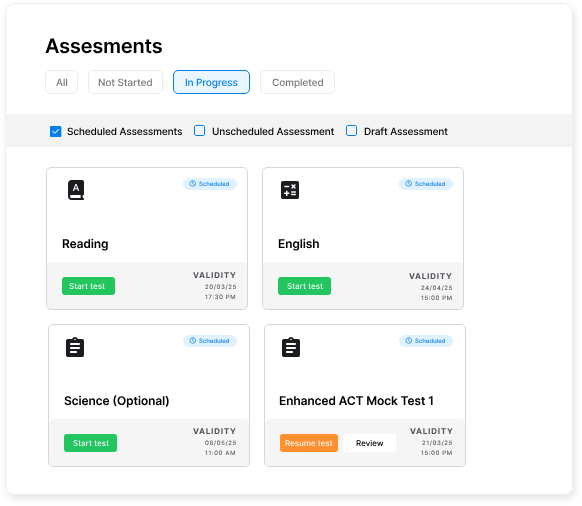




Key Takeaways
- Lead with process, not price, to highlight value before cost.
- Use diagnostics and data to justify pricing with measurable results.
- Offer structured prep plans to frame services as outcomes, not hours.
Most brilliant SAT tutors know the subject inside out—be it teaching strategies, grammar, or math concepts—but stumble when it’s time to talk about pricing. You might know your sessions are worth every dollar, yet when a parent hesitates, you feel the pressure to lower your rate or overexplain yourself.
This “money conversation” is where even brilliant tutors lose students before they’ve had a chance to show their value.
This guide on SAT pricing negotiation for tutors is designed to help you change that. By the end, you’ll know how to frame your services with authority, explain your value clearly, and handle objections without getting defensive.
You’ll also see how EdisonOS gives you data, structure, and reports that back up your words so parents view you as a professional, not just “someone who helps with SAT prep.”
Why tutors struggle with pricing conversations
Most tutors struggle with pricing because they’re afraid of rejection, feel inexperienced, or have never been trained in negotiation. The result? They either undercharge or give discounts too quickly.
Imagine that you quote your rate, the parent hesitates for a few seconds, and before they even respond, you say, “But I can offer a discount if that’s too much.” That single moment undermines your professionalism.
Parents want to trust you with their child’s future—if you sound unsure about your own value, they will not feel secure in hiring you.
What’s at stake isn’t just the fee for one student. It’s the perception of your expertise, your ability to retain clients, and your reputation as a serious professional.
What parents actually want to hear (before they say yes)
One of the biggest challenges is knowing how tutors should talk to parents about SAT prep cost without sounding defensive. Parents don’t want to hear a number dropped into thin air. They want to hear how that number translates into results and reassurance. At the end of the day, they’re not buying “hours of tutoring”—they’re buying outcomes for their child.
What they really want:
- Results: Concrete improvements in scores and confidence.
- Trust: A tutor who looks professional, structured, and reliable.
- A clear roadmap: A plan that shows how you’ll take their child from point A to point B.
- Transparency: Clarity on where their money is going—diagnostics, lesson planning, progress reports, and practice tests.
For example,
❌ My rate is $60/hr
✅ Here’s the 12-week roadmap I’ll use, including diagnostics, weekly progress reports, and targeted lessons. The investment for this program is $720.
The same number can sound structured, justified, and professional.
How to present your SAT pricing like a pro
The way you present your pricing determines whether they see it as a cost or an investment. Here are some practical tips you can use to lead the conversation with confidence and clarity:
Tip 1: Don’t lead with price; lead with your process
Parents often ask, “So, how much do you charge?” early in the conversation. If you answer straight away, the entire discussion becomes about price instead of value. Instead, walk them through your process first.
Explain how you diagnose student weaknesses, build a prep roadmap, and track progress. By the time you mention cost, they already see what they’re paying for.
If a parent pushes for numbers immediately, deflect politely: “I’ll share that in just a moment. First, let me walk you through how I structure prep so you can see what’s included.”
For example, you might explain: “I run a diagnostic to pinpoint your child’s weak areas, then we design a 12-week plan with weekly practice tests and progress reports. Once you see the structure, the investment will make sense.” This shifts the focus from “How much?” to “Is this the right plan for my child?”
Tip 2: Use SAT diagnostics to show need and urgency
Instead of telling parents their child “needs help,” show them. Start every conversation by sharing diagnostic results that reveal specific weaknesses—like pacing issues in math or repeated grammar errors.
Numbers don’t lie, and parents feel more urgency when they can see gaps clearly.
For example, you might say: “On the diagnostic, your child scored 12/20 on grammar questions but 18/20 on reading comprehension. That tells us where to focus—and why starting now will make a big difference.” When parents see evidence, they shift from debating costs to wanting solutions.
Tip 3: Offer structured prep plans, not just hourly rates
Parents don’t buy hours—they buy outcomes. If you only quote an hourly rate, it’s easy for them to compare you with cheaper tutors. But if you present a structured prep plan—like a 10-week program with clear milestones—you frame your service as a complete journey, not a commodity.
For example, instead of saying: “I charge $50 per hour,” you could say: “I offer a 10-week prep program that includes weekly sessions, full-length practice tests, and progress reports. By the end, your child will be test-ready with measurable improvements.” This sounds like a system, not just time.
Tip 4: Show what’s included: reports, strategy, personalization
Parents often ask: “Why should I pay more for you?” The best way to answer is by showing what’s included beyond the actual lessons. Progress reports, personalized assignments, and strategy sessions all build trust and justify your price.
Make these extras visible instead of keeping them in the background.
For instance, you can say, “Every week, I provide a report that shows exactly what skills improved and what still needs work. That way, you’ll never wonder where your child stands.” Parents want transparency and structure.
Tip 5: Use tiered pricing to offer flexibility without discounting
Not every parent can afford your top package, but that doesn’t mean you have to lower your rates. Instead, create tiered packages with different levels of support. This way, parents can choose the option that fits their budget without you underselling your value.
If you’re wondering how to charge for SAT tutoring, these models will give you clarity and flexibility.
For example, you might offer:
- Basic plan: Weekly lessons + monthly reports
- Standard plan: Weekly lessons + biweekly practice tests + reports
- Premium plan: Full diagnostic, weekly lessons, weekly tests, and detailed analysis
This structure lets parents decide on investment while you stay in control of pricing.
Tip 6: Back it all with a roadmap and timeline
Parents want to know not just what you’ll do, but when. A clear roadmap reassures them that there’s a strategy from day one. Lay out the journey: diagnostics in week 1, skill-building weeks 2–6, practice tests in weeks 7–9, and final review in week 10. This timeline makes your prep plan feel organized and predictable.
You might say: “Here’s our 12-week plan. By week 4, your child will be comfortable with algebra pacing. By week 8, we’ll focus on essay timing. By week 12, they’ll be ready for a full practice under exam conditions.” Parents pay more confidently when they can see the end goal mapped out.
Tip 7: Use EdisonOS dashboards to highlight value and progress
It’s one thing to say a student is improving, but another to prove it with data.
EdisonOS lets you track scores, pacing, and accuracy, then share these dashboards with parents. This turns your progress updates into visual proof that justifies your pricing.
For example, you could show a parent: “Here’s your child’s math accuracy—52% three weeks ago, now 72%. And notice their pacing improved from 65 seconds per question to 48.” Data builds confidence. Parents stop thinking about cost per hour and start appreciating the measurable value you bring.
Handling common pricing objections with confidence
Parents often bring up common SAT tutoring price objections, but with the right framing, you can turn these into opportunities to build trust. The key is to stay calm, empathetic, and firm.
Here’s how to handle the most common ones:
Objection #1: “We’ll try free resources first.”
“That’s a smart idea—free resources are great for exposure. The challenge is that they don’t diagnose where your child loses points or give a structured plan to fix those gaps. What I offer is a targeted approach: I run diagnostics, track progress, and adjust lessons so we focus only on what matters. In three months, that saves time, avoids burnout, and gets better results than trial-and-error studying online.”
Objection #2: “This seems expensive.”
“I understand—SAT prep is an investment. But let me show you what’s included: diagnostics, customized study plans, weekly reports, and full practice exams. If you compare this to group classes, they may be cheaper, but they’re one-size-fits-all. What I provide is personalized and efficient—your child spends less time on what they already know and more on what raises their score. That difference is what makes the investment worthwhile.”
Objection #3: “Do you guarantee a score increase?”
“That’s a fair question. No ethical tutor can guarantee a score increase, because performance depends on consistency and effort. But what I guarantee is structure, accountability, and data-driven support. Every week, you’ll see progress reports showing exactly where your child improved. That way, instead of waiting for test day to know if it worked, you’ll see measurable growth throughout the process.”
These are just examples to help you get started and build your own set of responses. Feel free to pick up relevant insights from these sample scripts depending on what suits your business. Remember to be confident and honest while responding to objections.
Pricing models that work for SAT tutors
The right pricing model depends on how you structure your lessons, the type of support parents expect, and how you showcase results.
Here are the most effective models tutors can use to stay professional and profitable:
- Hourly: Offers flexibility, but can feel unclear to parents since they don’t always see what the total commitment looks like. Works best for short-term or supplemental tutoring.
- Packages: Ideal for structured programs. For example, a 20-session package that includes diagnostics, progress reports, and practice tests gives parents a clear roadmap. They appreciate knowing exactly what’s included and what outcomes to expect.
- Retainer-based: Provides ongoing support across the entire test season. This model works especially well when paired with progress tracking and continuous feedback through a platform like EdisonOS, so parents can see consistent value week after week.
How EdisonOS can help you justify your pricing
Parents are far more willing to invest when they can clearly see structure, progress, and outcomes. EdisonOS gives you the tools to make that value visible—turning your pricing conversation from a discussion into a data-backed decision.
- Diagnostic assessments: Quickly identify where a student is losing points and show parents a clear starting baseline.

- Custom learning paths: Personalize prep plans so parents see their child isn’t wasting time on irrelevant material.
- Score tracking & reports: Keep parents engaged with weekly updates showing measurable improvement.

- White-labeled platform: Present everything under your brand, boosting trust and professionalism.
- Real test simulation: Mimic the digital SAT environment so students walk in fully prepared.
When you show parents data instead of vague promises, price objections fade fast.
The bottom line
Negotiating pricing is more about being prepared than being pushy. Parents want results, trust, and clarity. You can deliver all three by leading with your process, using diagnostics, and backing your fee with data.
With EdisonOS, you sell outcomes, not just hours. Progress dashboards, score tracking, and personalized study plans make your tutoring feel professional and results-driven.
You’ve put in the work to become a strong tutor. Now it’s time to be just as strong in your pricing conversations. Use EdisonOS to create a pricing-ready, data-backed SAT tutoring program that parents can trust.
Frequently asked questions
Tutors Edge by EdisonOS
in our newsletter, curated to help tutors stay ahead!
Tutors Edge by EdisonOS
Get Exclusive test insights and updates in our newsletter, curated to help tutors stay ahead!












.png)
.webp)
